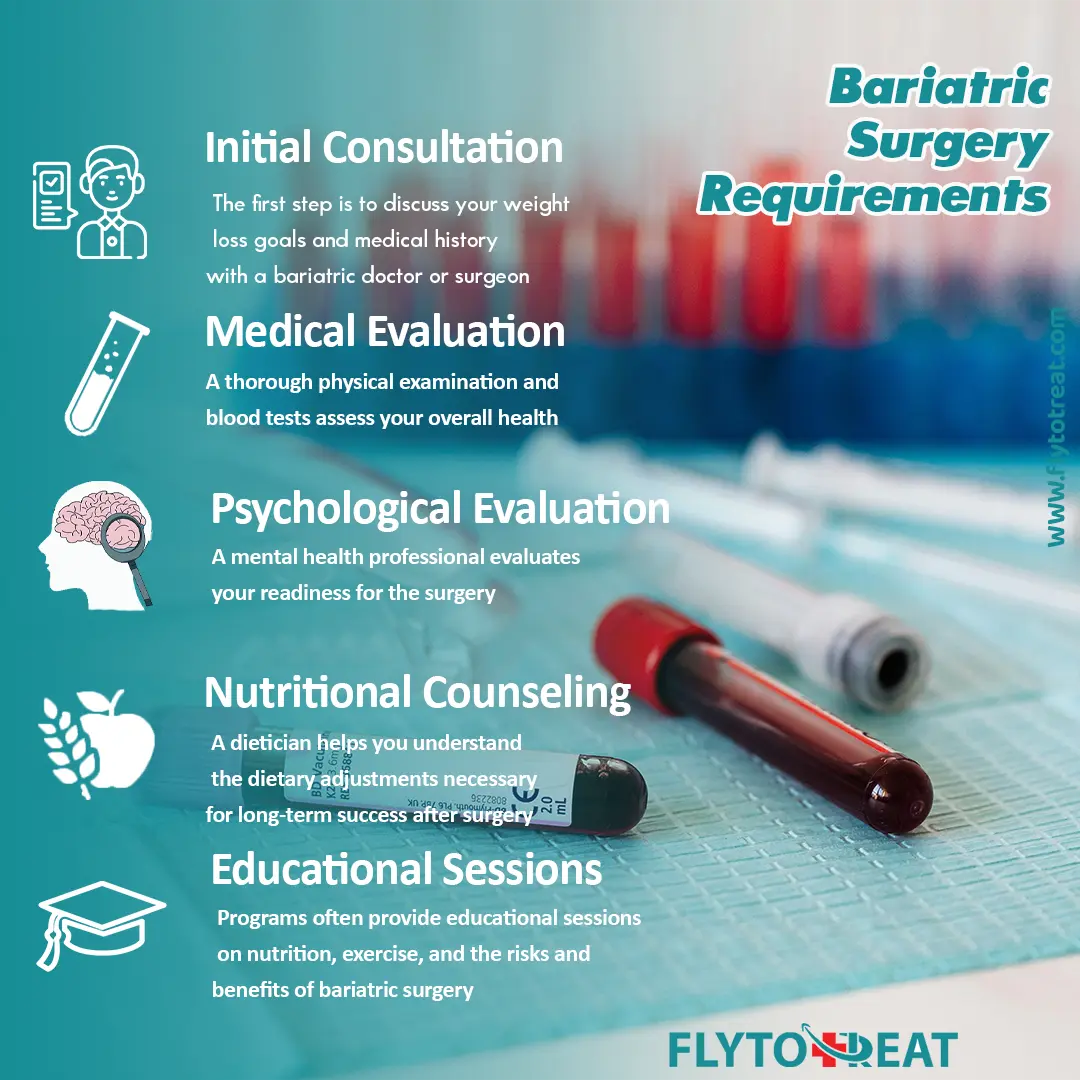
Who is a Good Candidate for Gastric Sleeve Surgery?
What disqualifies the gastric sleeve candidates?
Am I a good candidate for sleeve gastrectomy? A sleeve gastrectomy candidate must meet specific bariatric surgery requirements to ensure the best outcomes from this life-changing procedure. FlyToTreat stands ready to support patients in meeting these criteria, which include a qualifying Body Mass Index, a commitment to lifestyle changes, and passing a psychological evaluation, among others. Understanding these prerequisites is the first step towards a successful weight loss journey through surgery.
Bariatric Surgery Requirements: A Gateway to Weight Loss
Bariatric surgery, including sleeve gastrectomy, offers a potential solution for significant and sustained weight loss. However, it's not for everyone. Here's an overview of the general requirements for gastric sleeve candidates:
• Body Mass Index (BMI): Most programs require a BMI of 40 or higher or a BMI of 35 or more with serious weight-related health problems like diabetes or sleep apnea.
• Weight Loss Attempts: Documented attempts at weight loss through diet and exercise for a specific timeframe are typically required.
• Overall Health: A thorough medical evaluation ensures you're healthy enough to undergo surgery and manage the lifestyle changes afterwards. Feel free to check our article on A Comprehensive Guide to Lifestyle After Gastric Sleeve Surgery
• Commitment to Lifestyle Changes: Success relies on a long-term commitment to healthy eating habits and regular exercise.
• Psychological Evaluation: Assessing your mental readiness for surgery and lifestyle adjustments is crucial.
These are general guidelines. Eligibility criteria can vary between programs. Consulting a bariatric surgeon allows for a personalized assessment to determine if you are a sleeve gastrectomy candidate.
Unveiling the Bariatric Surgery Evaluation Process
Before undergoing sleeve gastrectomy, a comprehensive evaluation process ensures you're a suitable candidate and prepared for success. Here's what to expect about bariatric surgery requirements:
• Initial Consultation: The first step is to discuss your weight loss goals and medical history with a bariatric doctor or surgeon.
• Medical Evaluation: A thorough physical examination and blood tests assess your overall health and identify potential surgical risks.
• Psychological Evaluation: A mental health professional evaluates your readiness for the surgery and its significant lifestyle changes.
• Nutritional Counseling: A dietician helps you understand the dietary adjustments necessary for long-term success after surgery. For further details on the diet after gastric sleeve, feel free to check The Essential Guide to Gastric Sleeve Diet Success
• Educational Sessions: Programs often provide educational sessions on nutrition, exercise, and the risks and benefits of bariatric surgery.
This evaluation process is a two-way street. It allows you to learn about the surgery and ask questions while helping the healthcare team determine if your needs and health align with sleeve gastrectomy requirements.

Who is eligible for a gastric sleeve?
To be considered for gastric sleeve surgery, you must meet certain criteria. Your BMI should be 40 or higher, or if you have serious weight-related health problems, it could be 35 or more. You should have a documented history of weight loss attempts through diet and exercise, be in good overall health, and be committed to long-term healthy habits and regular exercise. Additionally, you should be psychologically ready for the emotional impact and lifestyle adjustments that come with the surgery. Remember that this is a general overview, and to know if you're eligible for a gastric sleeve, it's best to consult a bariatric surgeon for a personalized assessment.
How overweight to qualify for gastric sleeve
Body weight is a factor but not the sole indicator for qualifying for gastric sleeve surgery. Here's a breakdown:
• BMI Thresholds: A Body Mass Index (BMI) of 40 or higher is considered ideal for sleeve gastrectomy candidates.
• Lower BMI with Health Concerns: Some programs may consider patients with a BMI of 35 or higher if they have significant weight-related health issues like type 2 diabetes or sleep apnea. A high BMI with these conditions increases health risks.
• Focus on Overall Health: The bigger picture matters. Your overall health and ability to tolerate surgery are crucial considerations.
Weight requirements are guidelines. Consulting a bariatric surgeon provides a personalized assessment. They will consider your BMI, weight history, health conditions, and commitment to lifestyle changes to determine if gastric sleeve surgery is the right path for you.
What disqualifies the gastric sleeve?
As mentioned, while gastric sleeve surgery can be a powerful tool, only some are gastric sleeve candidates. Here are some factors that might disqualify you:
• Uncontrolled Medical Conditions: Severe, uncontrolled health issues like heart disease or uncontrolled diabetes can increase surgical risks.
• Mental Health: Uncontrolled mental health conditions or active eating disorders may impede your ability to follow post-surgical dietary and lifestyle changes.
• Unrealistic Expectations: The gastric sleeve is a tool, not a magic bullet. Unrealistic weight loss expectations or an unwillingness to commit to long-term lifestyle changes can affect success.
• Certain Past Surgeries: Prior abdominal surgeries, particularly those that alter the digestive system, may make sleeve gastrectomy too complex.
• Alcohol or Drug Abuse: Active substance abuse can significantly increase surgical risks and hinder post-surgical healing. For a detailed exploration of alcohol after sleeve gastrectomy, How long to drink alcohol after gastric sleeve?
This is not an exhaustive list. A bariatric surgeon will thoroughly evaluate your health and circumstances to determine if you are a gastric sleeve candidate.
BMI for gastric sleeve
Body Mass Index (BMI) plays a role but is not the only factor considered for gastric sleeve candidacy. Here's the breakdown:
• General BMI Threshold: A BMI of 40 or higher is typically considered ideal for sleeve gastrectomy.
• Lower BMI with Health Concerns: Some programs may accept patients with a BMI of 35 or higher if they have significant weight-related health problems like diabetes or sleep apnea.
• Focus on Overall Health: Your BMI is just one piece of the puzzle. Your overall health, ability to handle surgery, and commitment to lifestyle changes are equally important.
Remember: BMI is a guideline. Consulting a bariatric surgeon allows for a personalized assessment. They will examine your entire health picture to determine if bariatric surgery requirements align with your weight loss goals and overall well-being.
What BMI is too high for surgery
There isn't a strict maximum BMI for gastric sleeve surgery. However, the higher your BMI, the greater the surgical risks. Bariatric surgeons typically focus on a BMI above 35-40, prioritizing overall health and suitability for the procedure.
Psychological contraindications for bariatric surgery
While gastric sleeve surgery focuses on physical health, your mental state is equally important. Here are some psychological factors that might delay surgery:
• Uncontrolled Mental Health Conditions: Active depression, anxiety, or eating disorders can make it difficult to follow the post-surgical dietary and lifestyle changes crucial for success.
• Unrealistic Expectations: A gastric sleeve is a tool, not a miracle cure. Suppose you have unrealistic weight loss expectations or are unwilling to commit to long-term behavior changes. In that case, surgery might not be the best option.
• Substance Abuse: Active alcohol or drug dependence significantly increases surgical risks and hinders healing. Addressing addiction is essential before considering surgery.
This is not an exhaustive list. A thorough evaluation, including a psychological assessment, helps determine if you're mentally prepared for the surgery's emotional impact and the lifestyle changes it demands.
conclusion
While a gastric sleeve operation can significantly aid weight loss, it is not a universal solution. FlyToTreat assists in clarifying bariatric surgery requirements and identifying who is a suitable gastric sleeve candidate, ensuring that each patient is fully prepared for this transformational procedure's physical and emotional aspects. With comprehensive care, the journey toward sustainable health and well-being is within reach for those who qualify.
MEDICALLY REVIEWED BY: Dr. Ali Bazazi
AUTHOR: FlytoTreat's team of Authors
20 June 2023 - Updated At: 29 June 2024
Related Articles
Comment






